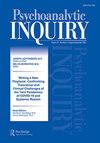Mother Tongue
IF 0.5
4区 心理学
Q3 PSYCHOLOGY, PSYCHOANALYSIS
引用次数: 0
Abstract
ABSTRACTIn language studies, mother tongue is linked to culture—its literature, artifacts, wisdom, generational ties, its jokes and proverbs, the names of flowers. A mother tongue carries the archive of one’s own history—a sense of belonging at the heart of identity, one’s central core. Language is among the first bonds between mother and child, words forging intimacy and communication. Yet, what happens when a mother tongue is associated with war and trauma? When language conveys displacement or the reenactment of a too-painful past? This essay explores the impact of growing up with a mother who suppressed her mother tongue and a daughter’s search for the language of home that followed.KEYWORDS: Languagewarwomendislocationmotherhome Disclosure statementNo potential conflict of interest was reported by the author.Additional informationNotes on contributorsAlexandra VietsAlexandra Viets is a writer/screenwriter and journalist whose work focuses on women and dislocation. Her first feature-length screenplay, Cotton Mary, won a New York Foundation for the Arts award and was produced by Merchant Ivory. Her film/theater reviews and essays have appeared in publications such as The International Herald Tribune/NYT, The Far Eastern Economic Review and the Asia Wall Street Journal. Viets has taught in the MFA programs at Towson University’s Department of Theater Arts and at The American University in Washington, DC, specializing in literature and film. She currently teaches in the MA in Writing Program at Johns Hopkins University. Excerpts from her memoir entitled, Maryna, After the War, have been published in Thin Air, Nowhere Magazine and shortlisted for Wasafiri’s New Writing Prize in London. Viets received her B.A. from Oberlin College in political science and an MFA from Columbia University.母语
在语言研究中,母语是与文化联系在一起的——它的文学、人工制品、智慧、代际关系、笑话和谚语、花名。母语承载着一个人自己的历史档案——一种身份核心的归属感,一个人的核心。语言是母亲和孩子之间最早的纽带之一,是建立亲密关系和交流的语言。然而,当母语与战争和创伤联系在一起时会发生什么呢?当语言传达位移或重演一个太痛苦的过去?这篇文章探讨了在一个压抑母语的母亲和女儿随后寻找家乡语言的环境中成长的影响。关键词:语言、战争、女性错位、母亲家园披露声明作者未发现潜在的利益冲突。作者简介:salexandra viet是一名作家、编剧和记者,她的工作重点是女性和错位。她的第一部长篇剧本《棉花玛丽》(Cotton Mary)获得了纽约艺术基金会奖,由Merchant Ivory制作。她的电影/戏剧评论和文章发表在《国际先驱论坛报》/《纽约时报》、《远东经济评论》和《亚洲华尔街日报》等出版物上。他曾在陶森大学戏剧艺术系和华盛顿特区的美利坚大学教授文学和电影艺术硕士课程。她目前在约翰霍普金斯大学教授写作硕士课程。她的回忆录《战后玛丽娜》(Maryna, After the War)的节选发表在《稀薄的空气》和《无处可去》杂志上,并入围了伦敦Wasafiri新写作奖。她在奥伯林学院获得政治学学士学位,在哥伦比亚大学获得硕士学位。
本文章由计算机程序翻译,如有差异,请以英文原文为准。
求助全文
约1分钟内获得全文
求助全文
来源期刊

Psychoanalytic Inquiry
PSYCHOLOGY, PSYCHOANALYSIS-
CiteScore
1.00
自引率
33.30%
发文量
65
期刊介绍:
Now published five times a year, Psychoanalytic Inquiry (PI) retains distinction in the world of clinical publishing as a genuinely monographic journal. By dedicating each issue to a single topic, PI achieves a depth of coverage unique to the journal format; by virtue of the topical focus of each issue, it functions as a monograph series covering the most timely issues - theoretical, clinical, developmental , and institutional - before the field. Recent issues, focusing on Unconscious Communication, OCD, Movement and and Body Experience in Exploratory Therapy, Objct Relations, and Motivation, have found an appreciative readership among analysts, psychiatrists, clinical psychologists and a broad range of scholars in the humanities.
 求助内容:
求助内容: 应助结果提醒方式:
应助结果提醒方式:


